From a traditional military march to a balloon parade, musical performances and a re-enactment of the nation’s history, tens of thousands of Taiwanese and foreigners yesterday experienced a series of unique celebrations for President Tsai Ing-wen’s (蔡英文) inauguration.
Hours before the ceremonies in front of the Presidential Office Building started, nearly 30,000 people had arrived, with some eager to find seats, while others talked with friends and took photographs against the backdrop of the main stage and the building.
A 21-gun salute also drew a large crowd, who surrounded the soldiers to take photographs.
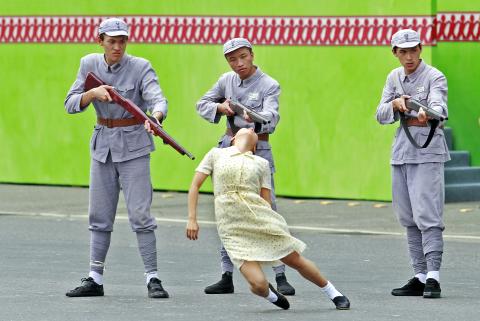
Photo: Chiang Ying-ying, AP
A performance by the joint military marching band started the celebrations at 9am.
Following the band’s performance was a re-enactment of Taiwanese history, from the activities of the Aboriginal inhabitants to the Dutch and Spanish occupation, the Han Chinese migration, Japanese occupation and the Chinese Nationalist Party (KMT) regime’s authoritarian rule after World War II. A performance about the nation’s democratization followed.
Various artists who have participated in social movements, such as rock band Fire Ex (滅火器), Lin Sheng-xiang (林生祥) and Panai Kusui, performed on a stage erected in front of the building.
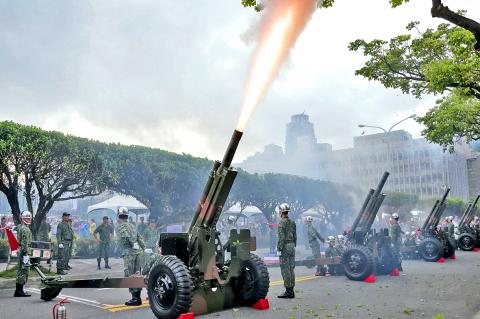
Photo: EPA/Military News Agency
Actors depicted campaigners for major political and social movements in Taiwan’s democratization — such as Deng Nan-jung (鄭南榕), who ran a number of dissident magazines and self-immolated in 1989 in protest against government restrictions on the freedom of speech, and the 1990 Wild Lily Student Movement, which helped accelerate the dissolution of the national assembly.
After Tsai and Vice President Chen Chien-jen (陳建仁) completed the official handover and swearing-in ceremony inside the Presidential Office Building, they walked out to greet the crowd and were saluted by the military band at 11am.
Before Tsai’s inaugural address, a group of Paiwan children, several children’s choirs and Jingmei Girls High School students joined Tsai and Chen in singing the Republic of China national anthem, rearranged to blend in with a traditional Paiwan tune.
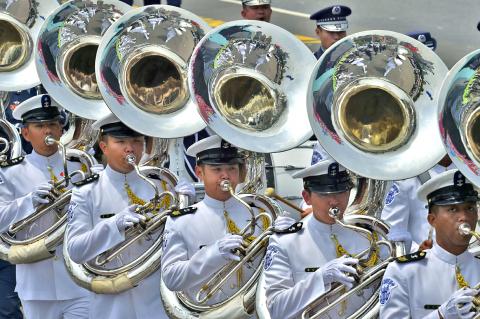
Photo: Sam Yeh, AFP
“This is not the first time I have attended a presidential inauguration, but the performances today were great. I liked them a lot,” onlooker Lan Cheng-peng (藍正朋) said. “In the past, programs were designed to convey a sense of the authority of the president, but this time, it is more like a festival and you could see that the celebrations were centered around the people, not the political leader.”
While the performances drew many positive reviews, they were not without detractors.
Some rights advocates said that some of the performances showed the popular belief that the arrival of Western religion and influenced helped rid Aborigines of their “boorish and uncultivated” characteristics.
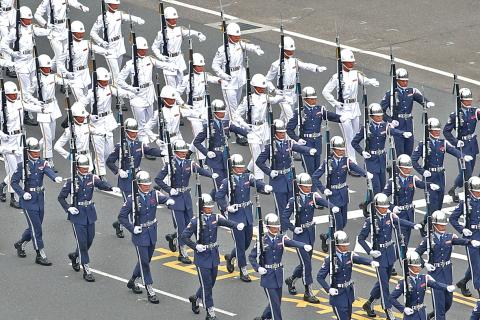
Photo: CNA
The celebrations ended with the singing of Meilidao (美麗島, Formosa) and a fly-by by the air force’s Thunder Tiger Squadron.
Meilidao, a folk song from the late 1970s, describes how beautiful Taiwan is and how the people’s ancestors are watching over them. The song was banned by the former Chinese Nationalist Party (KMT) government after the 1979 anti-government demonstration organized by Formosa magazine, which also became known as the Kaohsiung Incident.

Photo: Liao Chen-huei, Taipei Times
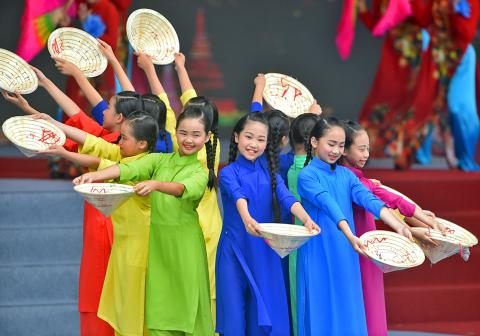
Photo: Liao Chen-huei, Taipei Times
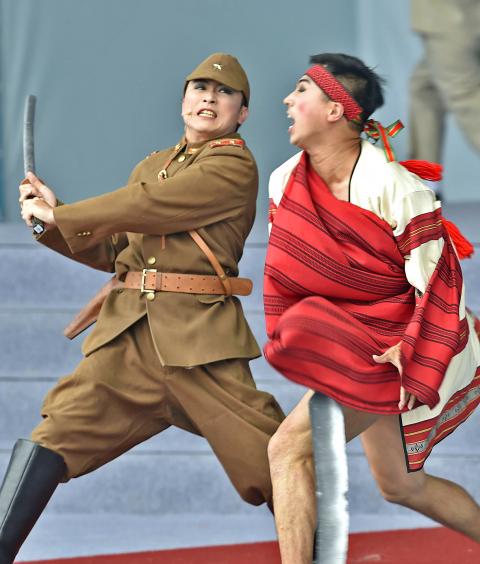
Photo: Sam Yeh, AFP

‘ABUSE OF POWER’: Lee Chun-yi allegedly used a Control Yuan vehicle to transport his dog to a pet grooming salon and take his wife to restaurants, media reports said Control Yuan Secretary-General Lee Chun-yi (李俊俋) resigned on Sunday night, admitting that he had misused a government vehicle, as reported by the media. Control Yuan Vice President Lee Hung-chun (李鴻鈞) yesterday apologized to the public over the issue. The watchdog body would follow up on similar accusations made by the Chinese Nationalist Party (KMT) and would investigate the alleged misuse of government vehicles by three other Control Yuan members: Su Li-chiung (蘇麗瓊), Lin Yu-jung (林郁容) and Wang Jung-chang (王榮璋), Lee Hung-chun said. Lee Chun-yi in a statement apologized for using a Control Yuan vehicle to transport his dog to a

Taiwan yesterday denied Chinese allegations that its military was behind a cyberattack on a technology company in Guangzhou, after city authorities issued warrants for 20 suspects. The Guangzhou Municipal Public Security Bureau earlier yesterday issued warrants for 20 people it identified as members of the Information, Communications and Electronic Force Command (ICEFCOM). The bureau alleged they were behind a May 20 cyberattack targeting the backend system of a self-service facility at the company. “ICEFCOM, under Taiwan’s ruling Democratic Progressive Party, directed the illegal attack,” the warrant says. The bureau placed a bounty of 10,000 yuan (US$1,392) on each of the 20 people named in

The High Court yesterday found a New Taipei City woman guilty of charges related to helping Beijing secure surrender agreements from military service members. Lee Huei-hsin (李慧馨) was sentenced to six years and eight months in prison for breaching the National Security Act (國家安全法), making illegal compacts with government employees and bribery, the court said. The verdict is final. Lee, the manager of a temple in the city’s Lujhou District (蘆洲), was accused of arranging for eight service members to make surrender pledges to the Chinese People’s Liberation Army in exchange for money, the court said. The pledges, which required them to provide identification

INDO-PACIFIC REGION: Royal Navy ships exercise the right of freedom of navigation, including in the Taiwan Strait and South China Sea, the UK’s Tony Radakin told a summit Freedom of navigation in the Indo-Pacific region is as important as it is in the English Channel, British Chief of the Defence Staff Admiral Tony Radakin said at a summit in Singapore on Saturday. The remark came as the British Royal Navy’s flagship aircraft carrier, the HMS Prince of Wales, is on an eight-month deployment to the Indo-Pacific region as head of an international carrier strike group. “Upholding the UN Convention on the Law of the Sea, and with it, the principles of the freedom of navigation, in this part of the world matters to us just as it matters in the